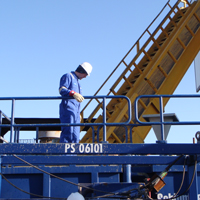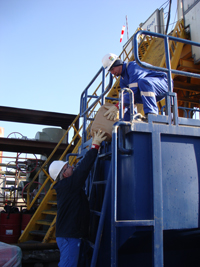Laurent Pirolli
We are pleased to introduce Laurent Pirolli, Ph.D., a Sensors Integration Engineer for Wireline at Schlumberger Technology Center in Sugar Land, Texas. Dr. Pirolli is a native of France who graduated with a bachelor's degree in chemistry from the University of Versailles. He received his master's degree from the French Petroleum School in Paris, after realizing a passion for the important roles of gas, oil and potable water in the 21st century. He then received a Ph.D. in physical chemistry from the University of Delaware, studying diffusion barriers for the microelectronics industry and catalysis at the molecular and atomic levels. This research widened his scientific background to surface chemistry and material science, which has been extremely valuable to him as an employee of an oilfield service company.
Sensors Integration Engineer for Wireline at Schlumberger Technology Center in Sugar Land, Texas. Dr. Pirolli is a native of France who graduated with a bachelor's degree in chemistry from the University of Versailles. He received his master's degree from the French Petroleum School in Paris, after realizing a passion for the important roles of gas, oil and potable water in the 21st century. He then received a Ph.D. in physical chemistry from the University of Delaware, studying diffusion barriers for the microelectronics industry and catalysis at the molecular and atomic levels. This research widened his scientific background to surface chemistry and material science, which has been extremely valuable to him as an employee of an oilfield service company.
As a petroleum engineer, what are you currently working on?
Currently, I am working on developing new tools to increase our capabilities in characterizing reservoirs down-hole, so that oil can be discovered and produced more economically.
to increase our capabilities in characterizing reservoirs down-hole, so that oil can be discovered and produced more economically.
What is something we might see in our daily lives that correlates to your work?
There are many things related to energy, gas, oil, water and sensors. The easiest one is your car: from the oil to fill up your tank to the small sensors in it to optimize its use.
How are your sensor devices used?
Our sensor devices can be used to improve the operation of a tool, all the way to characterizing the liquid or gas in the reservoir, so that appropriate decisions can be made on the zones to produce and on designing the surface facilities accordingly.
Can you tell us a little about the development of your new sensor?
Our goal is to improve the quality and offering of our services, and to do so, we develop new sensor technologies. It starts in our Research Centers, and once the sensor has reached a certain maturity, one of our Engineering Centers further develops and tests the sensor under field conditions, to make it reliable in the specified down-hole environment.
Tell us about your work in multi-disciplinary teams in engineering and research.
The most challenging and rewarding part of my job. When developing new technology, we rely on different expertise and experience from all over the world. Everybody has a specific expertise and a defined role, so working all together as a team is the key to developing a successful product.
successful product.
Both France and the United States rely on producing great scientists and innovators to remain leaders. It is a great challenge requiring a continuous effort, but it has great rewards, and I am looking forward to encouraging my own child in this endeavor!
Describe the patent experience—were there any bumps along the way for you?
I have learned a lot in my early years in the oil industry, and was lucky to work with Intellectual Property attorneys who educated me in making a strong patent case. Thanks to them, my patent experience has been very smooth.
What has the honor of induction into Sigma Xi meant to you?
It was an honor and a great reward to be accepted as a member after all the hard work during my PhD. For me, Sigma Xi has always been an elite society and to have the honor of being part of it has been an achievement and made all the hard work worthwhile.
Why do you believe honor societies are important?
Honor societies unite great minds from different fields, so that an expert from one field can educate experts from different fields. It is the best recipe to solve the greatest challenges!